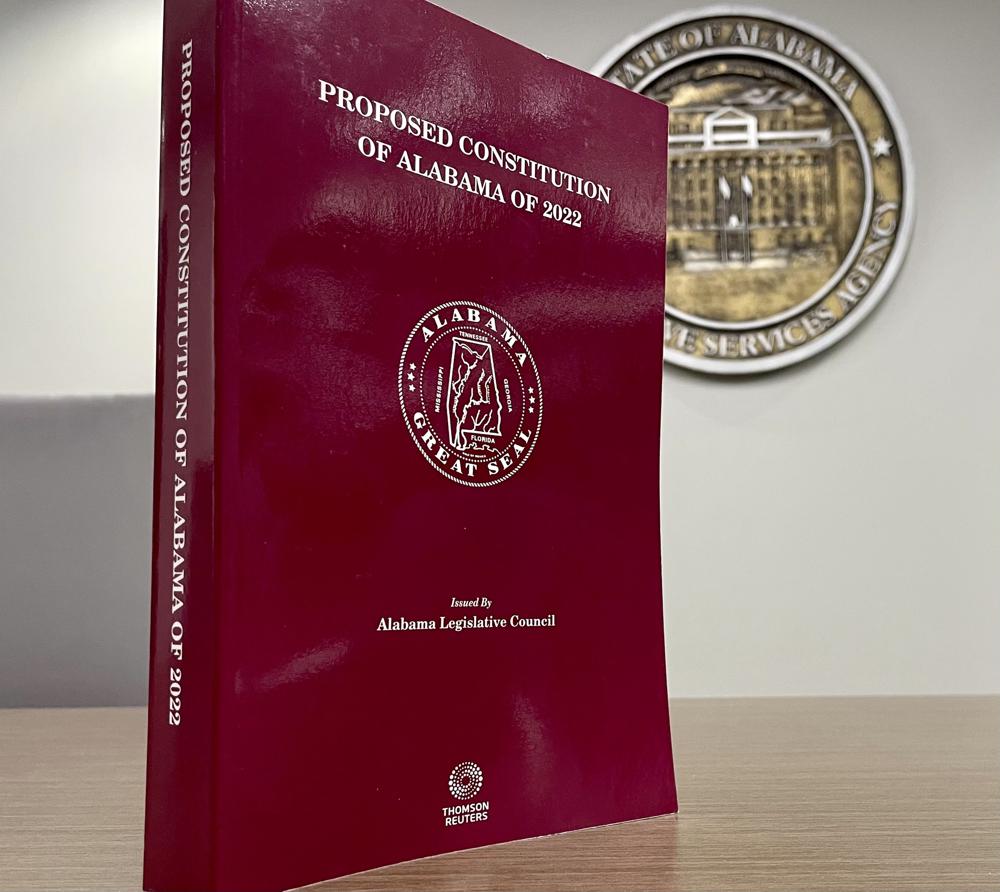Election 2022: A comprehensive guide to the Alabama Constitutional Amendments

Tomorrow, unlike swing states like Georgia, Pennsylvania, and Arizona, it’s safe to say that the results of all statewide offices will be a foregone conclusion in Alabama. Alabama Daily News polling, released last week confirmed that republican candidates were favored in the state with 62.4 favorability. (Polling that was subsequently ripped off by AL.Com, who reproduced it in its entirety, without permission from behind the ADN Inside Alabama Politics paywall.) According to Secretary of State John Merrill as many as 45-50% of eligible voters are expected to turn out. In addition to statewide offices and legislative races, there will also be a vote on a new recompiled Constitution and ten new constitutional amendments. Here’s a brief look at those constitutional changes on the ballot with summaries from the Associated Press, The Alabama Policy Institute (API), and other sources. If you’re looking to verify your polling place or are looking for sample ballots you can visit AlabamaVotes.gov for you can also find the Fair Election Commission detailed summaries of at this link on the Secretary of State website. Ratification of the Constitution of Alabama of 2022 The Fair Ballot Commission describes this saying, “The Constitution of Alabama of 2022 will only do the following: (1) rearrange the constitution so that similar subjects are located together; (2) remove racist language; (3) delete repeated or repealed portions/language; (4) place all amendments which deal with economic development together; and (5) arrange local amendments by county. The reorganized constitution will make no changes other than those listed above and will not make any changes relating to taxes.” The recompiled document deletes racist language and repealed provisions. It also reorganizes the sprawling document and makes it more user-friendly. The Alabama 1901 Constitution is the longest constitution in the country. This ratification comes Amendment One: The Fair Ballot Commission describes this by saying, “This amendment will change Section 16 to add crimes for which bail can be denied, to include murder, kidnapping in the first degree, rape in the first degree, sodomy in the first degree, sexual torture, domestic violence in the first degree, human trafficking in the first degree, burglary in the first degree, arson in the first degree, robbery in the first degree, terrorism, and aggravated child abuse of a child under the age of six.” Amendment one would create Aniah’s Law, which would limit bail for individuals accused of specified violent crimes. It is named after Aniah Blanchard, who was murdered by a man out on bond for attempted murder. API stated, “While the sentiment for ratifying the law is understandable, it does raise due process concerns for those accused, but not yet convicted, of crimes.” Governor Kay Ivey and Attorney General Steve Marshall urged voters to vote yes for Aniah’s law. Marshall stated, “Aniah’s Law—which you will find on your ballot as Amendment 1—amends the state constitution to allow judges the discretion to deny bond to violent criminals like Aniah’s murderer. So, on Tuesday, be sure to vote “yes” on Amendment 1, which will keep dangerous criminals off the street and the public out of harm’s way. And thank you to Aniah’s family for leading the charge to make Alabama a safer place.” Apryl Marie Fogel, Alabama Today’s publisher and host of Straight Talk with Apryl Marie on News Talk 93.1 FM, said, “Voting yes on Amendment 1 is a no-brainer! This amendment gives judges the ability to use their discretion to deny bail to those who have no business out on our streets. It doesn’t say they must stay in jail, but it says that a judge has the discretion to keep them there. Imagine being a victim or the loved one of a victim of a violent crime, knowing that the person responsible is back out on the street immediately. That’s unacceptable. One of the few responsibilities of government is to ensure public safety. That’s what this does and why we should pass it.” John Eidsmoe and Roy Moore expressed their concerns about the proposed law. “I feel terrible about what happened to Anaiah Blanchard,” Moore said. “But that is not a reason to go and change the constitution.” The Southern Poverty Law Center opposes this amendment telling AL.Com that it could lead to people who are not yet convicted of a crime “languishing in Alabama’s jails for years at a time.” Amendment Two: Amendment two would allow the state, county, and municipal governments to spend federal stimulus funding through grants for broadband infrastructure projects. The state has already allocated money for this purpose. API stated, “The primary concern with this amendment is that Alabama needs it for local governments to be able to spend the money for its authorized purpose in the first place. The state should not control the ability of local governments to spend already allocated money for its intended purpose.” Moore and Eidsmoe said that they are strongly opposed to both Amendments 2. Amendment three would require the Governor to notify the state Attorney General and a victim’s family before postponing or commuting a death sentence. Because then Governor Fob James was hesitant to execute a woman, in 1999, he commuted the death sentence of convicted murderer Judith Ann Neeley before he left office. The family of 13-year-old Lisa Millican, who was brutally raped and murdered by Mrs. Neeley and her husband, were outraged by Gov. James’ actions. This amendment is the Legislature’s response to that decision over twenty years ago. API has no concerns with this amendment. Amendment four to the constitution would require that any law impacting a general election be passed at least six months before the election. API stated, “A potential concern with this amendment is that it could limit the Legislature’s ability to make a necessary change to election law if unexpected circumstances arise less than six months before the next election. It comes down to a question of do you have faith in the government to use this power responsibly, or would you rather them not have the power at all?” Former state representative and current Jefferson County GOP Chairman Paul DeMarco urged voters to support this amendment,
Amendment three aims to change powers of clemency of Alabama governors

Under current law, the Governor of Alabama may grant a reprieve or clemency to a prisoner who has been sentenced to death. It is common to see convicted murderers ask the Governor to commute their sentence of death to life in prison. This seldom happens, but it has happened in the past. Amendment three, which is on the ballot for the general election on November 8, would not take away the Governor’s power to grant mercy to a convicted murderer. However, if voters approve, it would require that the Governor also notify the victim’s family before granting any such clemency. Both Houses of the Alabama State Legislature approved this amendment during the 2022 Alabama Regular Legislative Session. Senate Bill 196 was sponsored by State Senator Steve Livingston and cosponsored by State Sen. Sam Givhan. Amendment three proposes, “An amendment to the Constitution of Alabama of 1901, to require the Governor to provide notice to the Attorney General and to the victim’s family prior to granting a reprieve or commutation to a person sentenced to death, and to void the reprieve or commutation if the Governor fails to provide notice.” Currently, the Governor has the power to postpone or reduce a death sentence to life in prison. This amendment will require the Governor to notify the Attorney General and the victim’s family before postponing or reducing a death sentence. Failure of the Governor to provide notice will void the Governor’s action and allow the Attorney General to seek a new execution date from the Alabama Supreme Court. If the majority of the voters vote “yes” on Amendment 3, the Governor will be required to provide notice to the Attorney General and to the victim’s family prior to postponing or reducing a death sentence to life in prison. If the majority of the voters vote “no” on Amendment 3, the Governor will not be required to provide notice. Because then Governor Fob James was hesitant to execute a woman, in 1999, he commuted the death sentence of convicted murderer Judith Ann Neeley before he left office. The family of 13-year-old Lisa Millican, who was brutally raped and murdered by Mrs. Neeley and her husband, were outraged by Gov. James’ actions. This amendment is the Legislature’s response to that decision over twenty years ago. The Alabama 1901 Constitution is the longest constitution in the country. To connect with the author of this story, or to comment, email brandonmreporter@gmail.com.

